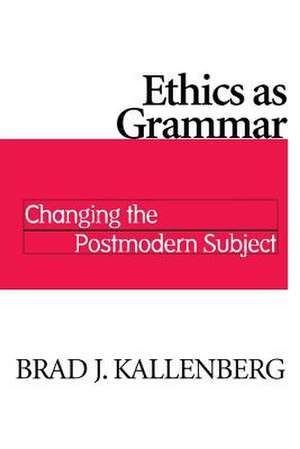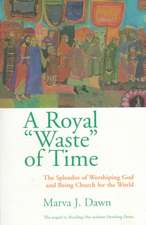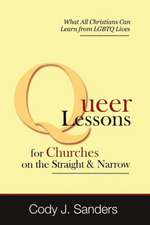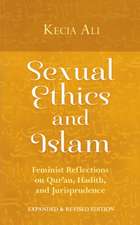Ethics as Grammar – Changing the Postmodern Subject
Autor Brad J. Kallenbergen Limba Engleză Paperback – 30 iul 2017
| Toate formatele și edițiile | Preț | Express |
|---|---|---|
| Paperback (1) | 277.90 lei 6-8 săpt. | |
| MR – University of Notre Dame Press – 30 iul 2017 | 277.90 lei 6-8 săpt. | |
| Hardback (1) | 594.58 lei 6-8 săpt. | |
| MR – University of Notre Dame Press – 13 sep 2001 | 594.58 lei 6-8 săpt. |
Preț: 277.90 lei
Nou
Puncte Express: 417
Preț estimativ în valută:
53.18€ • 54.94$ • 44.24£
53.18€ • 54.94$ • 44.24£
Carte tipărită la comandă
Livrare economică 20 martie-03 aprilie
Preluare comenzi: 021 569.72.76
Specificații
ISBN-13: 9780268159689
ISBN-10: 0268159688
Pagini: 346
Dimensiuni: 152 x 229 x 15 mm
Greutate: 0.46 kg
Editura: MR – University of Notre Dame Press
ISBN-10: 0268159688
Pagini: 346
Dimensiuni: 152 x 229 x 15 mm
Greutate: 0.46 kg
Editura: MR – University of Notre Dame Press
Notă biografică
Recenzii
“In his carefully crafted and insightful Ethics as Grammar, Brad Kallenberg portrays a dependent relation between two important thinkers.... [I]t is a surprising one. He suggests that you cannot really understand Stanley Hauerwas until you have read Ludwig Wittgenstein. Who would think of associating these two minds? Kallenberg, however, makes the case brilliantly and in the process adds much to our comprehension of both thinkers.” —Pro Ecclesia
“In this perceptive and often mesmerizing book Kallenberg suggests innovative readings of two of the 20th century’s most significant ethicists, Ludwig Wittgenstein and Stanley Hauerwas. . . . He has a perceptive and unconventional interpretation of the challenges facing theological ethics today.” —Theological Studies
"This study of the work of Ludwig Wittgenstein and Stanley Hauerwas offers a much-needed contribution to contemporary theological ethics. The degree of difficulty that is involved in studying either of the subjects of this book is high enough, but to take on both is nothing less than stunning. . . Thanks to Kallenberg's excellent study, philosophical and theological understanding of these issues has been newly enriched. I predict that in the years to come Ethics as Grammar will be a central text for theological ethicists writing after Hauerwas." —Journal of Religion
Textul de pe ultima copertă
“Kallenberg's book is well-researched, energetically written, and stocked with engaging illustrations. By tracing the evolution of concepts such as form and self/subject through Wittgenstein's early, middle, and late writings, it has given me a better understanding than ever before of the sweep of Wittgenstein's thought—it even makes me want to re-read the Tractatus! Kallenberg's elucidation of the Wittgensteinan presuppositions of Hauerwas's ethics shows the importance of appreciating Hauerwas as a philosopher as well as premier Christian ethicist of our day. I recommend Ethics As Grammar with great enthusiasm.” —Nancey Murphy, Professor of Christian Philosophy, Fuller Theological Seminary.
“For some years now Stanley Hauerwas has been engaged in the task of rethinking Christian ethics, imaginatively and controversially; Brad Kallenberg brings to bear his deep knowledge and understanding of the later philosophy of Wittgenstein to illuminate Hauerwas's project and Wittgenstein's, in ways that do justice to both—a remarkable achievement!” —Fergus Kerr, Regent, Blackfriars Hall, University of Oxford and Honorary Senior Lecturer, Divinity Faculty, University of Edinburgh
“Ethics as Grammar represents a quite flawless account of Ludwig Wittgenstein’s ‘project’ as well as a comprehensive overview of Stanley Hauerwas’s work, calling attention to the way in which Wittgenstein’s strategies inform Hauerwas’s.” —David B. Burrell, C.S.C., Theodore Hesburgh Professor in Philosophy and Theology, University of Notre Dame
“In this extraordinary book, Kallenberg, by drawing on Wittgenstein, wonderfully exposes the high wire act that constitutes ‘my work’. This is an absolutely wonderful book. I learned again what I had forgotten.” —Stanley Hauerwas, Gilbert T. Howe Professor of Theological Ethics, Duke University
“For some years now Stanley Hauerwas has been engaged in the task of rethinking Christian ethics, imaginatively and controversially; Brad Kallenberg brings to bear his deep knowledge and understanding of the later philosophy of Wittgenstein to illuminate Hauerwas's project and Wittgenstein's, in ways that do justice to both—a remarkable achievement!” —Fergus Kerr, Regent, Blackfriars Hall, University of Oxford and Honorary Senior Lecturer, Divinity Faculty, University of Edinburgh
“Ethics as Grammar represents a quite flawless account of Ludwig Wittgenstein’s ‘project’ as well as a comprehensive overview of Stanley Hauerwas’s work, calling attention to the way in which Wittgenstein’s strategies inform Hauerwas’s.” —David B. Burrell, C.S.C., Theodore Hesburgh Professor in Philosophy and Theology, University of Notre Dame
“In this extraordinary book, Kallenberg, by drawing on Wittgenstein, wonderfully exposes the high wire act that constitutes ‘my work’. This is an absolutely wonderful book. I learned again what I had forgotten.” —Stanley Hauerwas, Gilbert T. Howe Professor of Theological Ethics, Duke University








